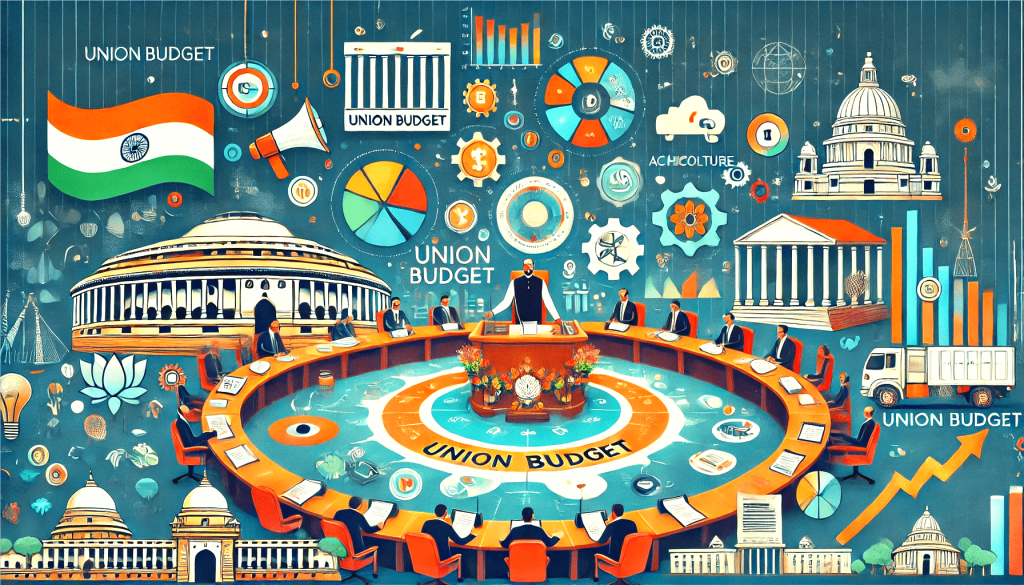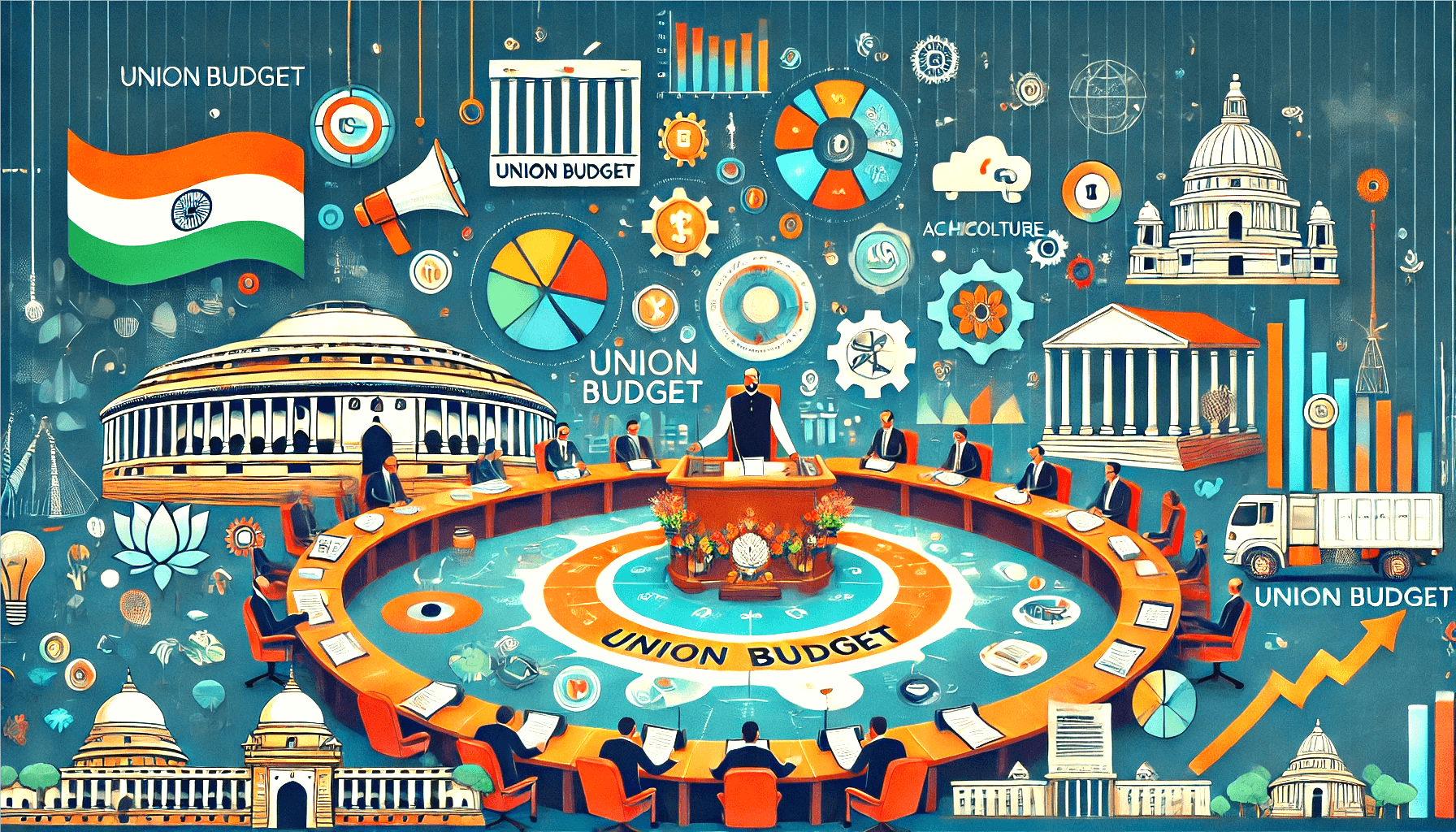Table of Contents
The Union Budget in India is an important financial event of the country which determines its growth and spending plans for the upcoming year. It is projected by the Finance Minister in the Parliament of India on 2nd of February and depicts the government’s income, expenditure and policies for the country during the forthcoming year. The union budget always provides these guidelines that are essential for economic planning and development, and other aspects of the economy. This article is dedicated to the focus of the Union Budget, its importance, timeline and, rest economic activities affected by it.
The Union Budget of India, for instance, is delivered on every 1st of February of the ongoing year, although it is supra claimed that the schedule of the government may alter that date peculiar circumstance. The finance minister, who is almost always accompanied by top officials from the finance ministry, delivers the budget address on the floor of Lok Sabha, the lower house of Parliament. This speech is most frequently viewed as a statement of the priorities of the government and the economic policies in place, as well as the financial position of the country.
In 1999 it was decided that this budget speech would be given on 1st of February. Earlier, the budget meeting took place on the last working day of February. This adjustment was made in order to facilitate the allocation and operational precedents associated with taxation after the new financial year budget which commences on April 1st.
The budget meeting is followed by discussions, debates, and, in some cases, voting in favor of or against the proposed procedures of the budget, which causes it to undergo some changes before finally being approved by parliament. Afterwards, the financed actions get enacted and the budgetary policy framework for the upcoming year is initiated.
Structure of the Union Budget
The Union budget contains certain documents that aid in budgetary and fiscal planning of the government such as:
Annual Financial Statement: This is a forecast document that showcases revenue and expenditure estimates for the next financial year. It explains the breakdown of tax revenues, other revenues like loans, alongside the spending plans on various sectors.
Receipts and Expenditures: These sections give an account for the anticipated government receipts like grants, taxes and borrowings, and expenditure on areas such as infrastructure, defense, education, as well as welfare. These are critical for analyzing the overall government economic policies such as whether the aim is to achieve fiscal consolidation or stimulate the economies growth level.
Fiscal Deficit Targets: These expenditures are critical and one of the most important aspects within the union budget such as the fiscal deficit of the government. The fiscal imbalances of the country ýs deficit is the difference between the revenue collections and the governments expenditures. The challenge for the government is to control spending whilst creating a sustainable target over periods for this deficit.
Economic survey: The economic survey is issued the same day as the Union’s budget, and although its not directly linked, it contains challenges, growth expectation, and inflation rate, also a detailed report on the economy’s current state.
Revenue and Capital Budgets: The Revenue Budget includes the revenue covering the government’s income (revenue receipts) and the current expenditure (goods and services provided, interest payments, etc). Similarly, the Capital Budget is where long-term investment like infrastructure, capital expenditure budgets, and borrowing needs are catered to.
The Planning Process and Importance of Budgeting
The Planning process for the Union Budget works many months before the Budget is delivered in Parliament. The Government normally starts consultations with industry ministries and representatives or economic professionals during the second half of the year. Ministries issue their budget needs and the Ministry of Finance consolidates them into a single document.
The Finance Minister with the senior officials in the Finance Ministry analyses the national economy, the government’s directives, and the needs of sectors. In the recent past, greater attention has also been devoted to issues such as sustainable development, digitalization, and inclusive growth.
An important area of consideration in the Union Budget is the tax policy which encompasses changes in income and corporate tax rates and other indirect taxes. It is possible for the government to specify fiscal policies or incentives for some industries and social services. Moreover, the Budget includes plans for additional projects, like new educational or healthcare facilities, infrastructure, or agricultural development, as well as detailing future prospects for the country.
Impact on the Economy and the Public
The Union Budget affects all members of society from companies to the most ordinary taxpaying citizens. The following are the most important ways in which it impacts the economy and public life:
Economic Expansion and Growth: The Budget is a significant element in the formulation of economic policy. It reflects the government’s intention with regard to the development of a country’s infrastructure, technology, healthcare, and other related sectors. The government can use the funding to initiate specific programs which are expected to promote investment in certain areas. Growth in economic activity, Employment expansion, and increased standards of living are all possible under a properly constructed Budget.
Changes to Tax Policies: In the Union Budget, we often see tax breaks or reforms. Income tax slabs may be reduced; corporate taxation may change; there might be changes in GST (Goods and Services Tax); or there might be changes in duties on imports and exports. Such tax changes have a direct impact on people, businesses, and the economy as a whole.
Welfare and Other Public Services: The Annual Budget mostly carries announcements of welfare programs of various NGOs, such as poverty alleviation, education, healthcare, housing, and employment schemes. It may also set new subsidy schemes or enhance funding for already existing schemes so that certain groups of society may be benefitted.
Inflation and Interest Rates: Taxes and budgetary policies directly affect or set the inflation and interest value of any country. A broad-based or expansionary budget (one which encourages more spending increases government expenditure and borrowing) often causes inflation but a tight or contractionary budget helps bring down inflation at the expense of slower economic growth.
Market Expectations: Investors from outside the country carefully watch the Union Budget looking for how stable and how the future of the Indian economy is likely to be. It is clear that a reasonable budget would increase the number of investors in India, while a bad budget would drive investors away.
Issues and Reviews of the Union Budget
The Union Budget is an important economic planning element, but it has its issues and review. The budget sometimes receives ire from the public for being too politicized or disproportionately favorable to certain industries. Critics also argue that some budgetary allocations fail to tackle reality issues like unemployment, poverty, and infrastructural deficits in a sustainable manner. Furthermore, the question of whether budgetary proposals will indeed be put into effect comes into play. Skeptics contend that more often and rather than later allocated funds never actually reach the ground level where they are required.
Another commonly raised issue is that of fiscal deficit. Every government aims at balancing its financial books. However, this has resulted into borrowing which causes expenditure to increase, consequently, increasing the debt burden.

Conclusion
The Union Budget is not merely an invoice, but a crucial document that serves as a plan for the country’s growth, balance, and prosperity. This gives the government the chance to pledge its allegiance towards the country’s progress. The examination of the policies presented in the Budget begins the moment it is presented and the impact from it affects both the public and businesses. The changes in the Budget whether it is tax, welfare, or economic reforms, all have an impact on the lives of the people and how the world sees India.
If you are interested for more: The Importance of the Tiranga Rally 2025: Unification and Patriotism Understanding the Union Budget Time 2025: An Event of Unique Importance in India











